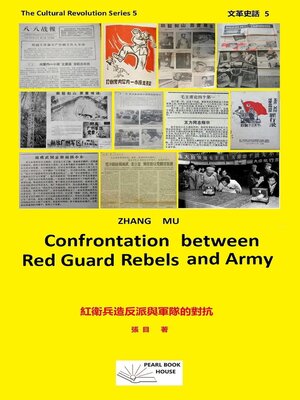Confrontation between Red Guard Rebels and Army. 紅衛兵造反派與軍隊的對抗
ebook ∣ The Cultural Revolution Series
By Zhang Mu, 张目

Sign up to save your library
With an OverDrive account, you can save your favorite libraries for at-a-glance information about availability. Find out more about OverDrive accounts.
Find this title in Libby, the library reading app by OverDrive.



Search for a digital library with this title
Title found at these libraries:
| Library Name | Distance |
|---|---|
| Loading... |
On May 16, 1966, Mao Zedong issued a central notice to launch the cultural revolution,calling to ferret out "capitalist roaders in power in the party, government, and military". In fact, before and after "shelling command", especially after military "supporting the left" and "military control", and newly formed Revolutionary Committee, all the leaders are military authorities. The Central Cultural Revolution instigated the masses of the two factions to "seize power", "great fighting", "impact on the military region", etc., forming a national civil war situation. After Mao called on the "armed left", the position of the Red Guards and rebels was higher than that of the army. Under the pressure of the central cultural revolution, all the military regions had self-criticize to the Red Guards rebels and admitted that they had" made mistakes ", which caused political instability. In fact, the most fierce and largest Red Guard rebels and army confrontation movement in the country was the in July 1967,"July 20th, Wuhan incident" (this content is listed separately to introduce in Volume 7 of the series , "The July 20th Incident in Wuhan" ). After reflecting on Wuhan "July 20" incident, Mao carried out a great transformation of the Cultural Revolution strategy, abandoned the Red Guards rebels, and, in order to appease the army, took Wang Li, Guan Feng and Qi Benyu of the Central Cultural Revolution as "scapegoats" and knocked them down with the crime of "seizing a handful of people in the army". Moreover, Mao even further brought down the "Yang Chengwu, Yu Lijin, and Fu Chongbi Incident". Later, the "army and worker propaganda teams" were sent to the schools to disband the Red Guard rebels. In quelling the great fighting of Tsinghua University, the workers' propaganda team suffered heavy casualties , Mao sent the foreign guests his mango to convey condolences to the workers' propaganda team. Since then, some people have made wax mango as a sacred thing.







